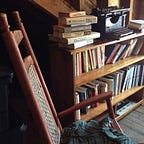FROM The Attic — for a Kinder, Cooler America
It’s a long way from Mississippi to Manchester but the blues made the journey. As American teens were discovering the Beatles, Brits were cueing up scratchy records by bluesmen scarcely known stateside. Big Bill Broonzy. Blind Willie Johnson. Howlin’ Wolf.
On a rainy spring day in 1964, thousands filled an abandoned Manchester train station done over to look like a Delta whistle stop. Crowds waiting to see Muddy Waters clapped to the beat of piano and bass. Then a horsedrawn carriage pulled up. From it stepped a stocky woman in high heels and white fur.
“Oh, this is the wonderfulest time of my life,” she said as she approached the stage. “And it’s rainin’ and the people are so sweet to stay here and listen.” Then the 49-year-old woman strapped on an electric guitar and blew them away.
Didn’t it rainnnnnnnn, children,
Didn’t it rainnnnn…
Her voice blazed and bellowed, but it was her guitar that amazed the crowd. Lightning licks, bluesy riffs, sliding Delta soul. “That old woman plays like Chuck Berry,” some said. But it was Chuck Berry — and Elvis and Little RIchard and Jerry Lee Lewis — who learned from Sister Rosetta.
Bob Dylan called her “a powerful force of nature.” Others called her “the godmother of rock n’ roll.” A dozen years before rock’s rise, Sister Rosetta Tharpe braided the wild threads of American music into a sizzling style that preached the gospel, cried the blues, and defied anyone to stop her.
HEAR FIVE BY SISTER ROSETTA IN “I HEAR AMERICA SINGING”
Born on a cotton plantation in 1915, Rosetta Nubin was Arkansas’ answer to Mozart. Her father was a soulful singer, her mother a “stomp down Christian” who preached and played the mandolin. And at age four, Rosetta took up the guitar. Within two years, she was standing atop a piano, billed as a “singing and guitar playing miracle.”
When her parents split, Rosetta’s mother took her to Chicago where blues, jazz, and gospel saturated the South Side. Mother and daughter played in Pentecostal churches, then toured the South. At 19, Rosetta married preacher Thomas Tharpe, but seeing that he was using her just to get work, she and her mother left for Harlem.
In 1938, Rosetta cut four songs for Decca. All became hits, landing her at Harlem’s Cotton Club. But Big Band America wasn’t ready to rock, so Sister Rosetta set her guitar aside and belted out saucy “race records.” Gospel fans were shocked to hear her sing “I Want a Tall, Skinny Papa.”
Singing gave her a career, but Rosetta also wanted to play, so in 1943, she struck out on her own. GIbson and Fender were experimenting with electric guitars and Rosetta was one of the first to use distortion, electrifying crowds with soaring riffs that fused blues scales with a blazing beat. Chuck Berry often said that his career was “one long Rosetta Tharpe impersonation.” When told she “played like a man,” she said, “Can’t no man play like me.”
“Rosetta had a one-on-one with everybody,” one singer said. “There could be eight-nine hundred people but she had a one-on-one with you. Because she could make that guitar talk just like you were there with her, like you helped to write the song.”
In the age of Jim Crow, Sister Rosetta defied segregation, playing with the gospel group, the Jordanaires, whom she called “my four white babies.” And in 1952, at the height of her career, Rosetta married her manager before 25,000 at Washington DC’s Griffith Stadium. After saying “I do,” still in her wedding dress, she rocked the crowd from centerfield.
When young white men took rock to the masses, Rosetta fell from favor, but she rode the blues train to Europe, doing annual tours with B.B. King and others. Brits who saw her Manchester concert included Mick Jagger, Keith Richard, Eric Clapton, Jeff Beck. . . The blues had a baby, as Muddy Waters sang, and they named it rock n’ roll.
But you hate to see that evenin’ sun go down, and Rosetta’s set too soon. Her mother died in 1968. Then came a stroke, diabetes, and in 1973, a second stroke. She was buried in Philadelphia in an unmarked grave.
In the last two decades, Sister Rosetta’s songs have been enshrined in the Library of Congress. A 2008 tribute concert raised funds for a gravestone. PBS American Masters series began a write-in campaign that landed her in the Rock n’ Roll Hall of Fame. But from her debut as “a miracle” to the “wonderfulest time of my life,” Sister Rosetta knew. She just knew. With her eyes lifted skyward, she sang:
If when you give
The best of your service
Telling the world
That your Savior has come
Be not dismayed
When men won’t believe you
He’ll understand, oh yes, He will
And say, oh yes, “Well done”
